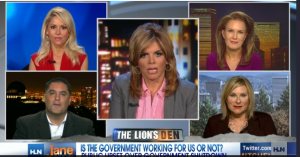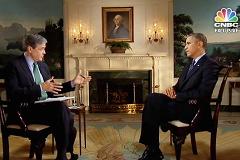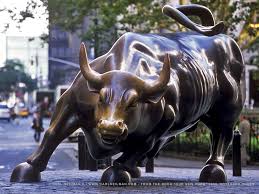
After I blithely predicted on HLN’s Jane Velez Mitchell’s program that the debt ceiling battle would be settled and there would be nothing to see here, I noticed these two headlines Pete the Banker sent me.
And here’s what Wall Street heard the President say,

President Barack Obama’s best friend could be Wall Street’s worst nightmare.
A little market crisis—not enough to crash the economy into recession but enough to stir public fear that would push Republicans to the negotiating table—could be just what settles the impasse in Washington and reopens the government, according to investing pros and market observers.
In an exclusive interview with CNBC, the president warned Wall Street that this shutdown could be different. Previous halts in nonessential government activities have caused little market reaction, with major averages actually rising most of the time in the month after the shutdowns are settled.
No Title
POTUS telling Wall Street to react: “I think this time is different. I think they should be concerned.” // Dow may drop big tomorrow?
No Title
Hey @chucktodd! Shouldn’t you be asking, “Wait. Is Obama trying to make the stock market crash?” #hack
Today was another item in my inbox. This comment from Jim Geraghty’s Morning Jolt newsletter,
Does Obama Secretly Want a Default? Or Does He Think He’ll ‘Win’ One?
Ben Domenech, also known as That Guy Who Writes That Other Newsletter,offered one of the more chilling thoughts in recent memory, closing this section of this essay:
There are three big questions now: First, will Republicans feel any real pressure over the government shutdown, or will the Chicken Little talk turn out to matter very little, in the same way it did with sequestration? Second, will conservatives define their terms for victory, settling on what a policy win looks like short of defunding Obamacare — accepting that they won the tactical argument, will they settle on something that represents an acceptable policy shift short of their bigger asks, coming away from all this with something they can point to as a policy win? And third — and this is the most troublesome one: will Obama call the debt ceiling bluff — would he actually be willing to default and throw the markets into chaos, knowing the media will blame Republicans anyway, in defense of his signature on his namesake law?
Increasingly, I suspect the answers are: no, no, and yes.
Like most others, I figured that the debt-ceiling negotiation would repeat the familiar pattern: a lot of bluster and posing, followed by fears that there would be no deal by the deadline, then a lot of serious eleventh-hour horse-trading, and it all gets resolved in a deal right before the deadline. This pattern reaches the familiar conclusion because that the pain of a mediocre deal was and usually is less than the pain of failing to reach a deal.
But Obama has already gassed up his blamethrower:
“When you have a situation in which a faction is willing to potentially default on U.S. government obligations, then we are in trouble,” he said. “And if they’re willing to do it now, they’ll be willing to do it later.”
The President forgets himself, I believe, when he gives signals that he’s willing to tank the economy to make a political point. Community activists, not Presidents, act this way. This situation reminds me of one of my favorite scenes in the best baseball film ever made, Bull  Durham. In one scene, Crash, the Durham Bulls catcher, goes to the mound to talk to Nuke, the new hotshot pitcher he’s supposed to be mentoring. He tells Nuke to hit the mascot, a cartoonish looking bull, with a fastball. When the mascot goes down, Crash tells the next batter he has no idea where the next pitch is going so the batter had better not dig in and crowd the plate.
Durham. In one scene, Crash, the Durham Bulls catcher, goes to the mound to talk to Nuke, the new hotshot pitcher he’s supposed to be mentoring. He tells Nuke to hit the mascot, a cartoonish looking bull, with a fastball. When the mascot goes down, Crash tells the next batter he has no idea where the next pitch is going so the batter had better not dig in and crowd the plate.

Bull Durham – Throw it at the Bull
One of the the funny moments in the movie…
After I read the alarming articles, I was in the yard when my neighbor, an investor and capitalist, walked by with his dog. I asked him about this. He shook his head and told me he’d gone to a 35% cash position because he can’t trust any of these people. He said, “those people just don’t know what they’re doing to the economy.” I didn’t ask if he meant the President or Congress. I think he meant both.



